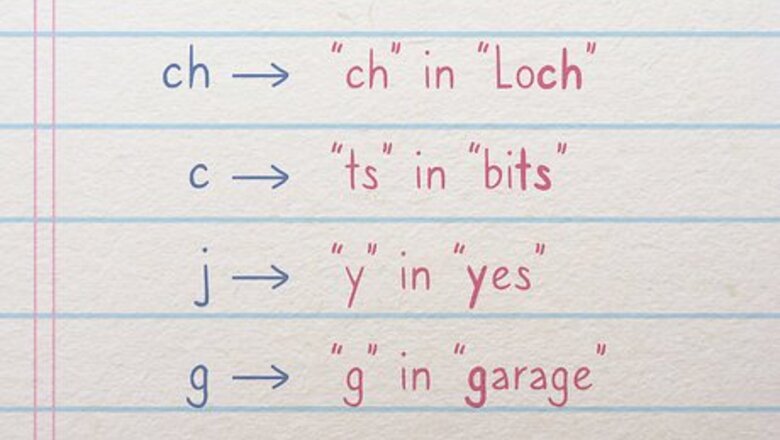
views
X
Research source
Mastering the Alphabet and Pronunciation
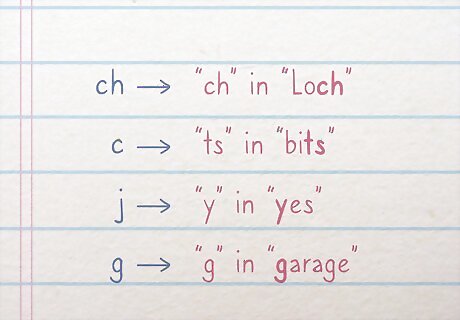
Start with the basic consonants. The Czech alphabet includes 22 consonants, many of which are pronounced the same as the similar letter in English. However, there is one consonant, "ch," that doesn't exist in English. There are also a few letters that sound somewhat different from their English counterparts. The Czech "ch" is a guttural sound, similar to the "ch" in the Scottish word "loch." You'll also be familiar with this sound from the German pronunciation of "ch." The Czech "c" sounds like the "ts" in the English word "bits." The Czech letter "j" sounds like the "y" in the English word "yes." This is similar to the Spanish pronunciation of the letter "j." In Czech, the letter "g" always produces a hard sound, like the first "g" in the English word "garage" (but never like the second "g" in the same word). The letters "q," "w," and "x" appear in foreign words only, and are pronounced as they would be in the origin language.
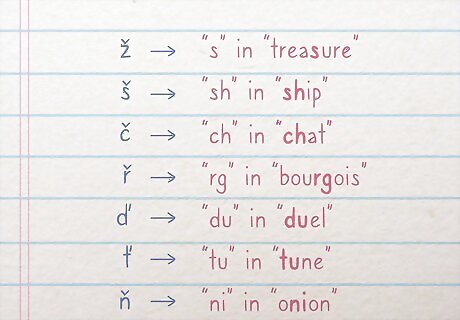
Distinguish soft consonants from hard consonants. The basic consonants are considered "hard" consonants. Some consonants also have soft versions, which are distinguished from their hard counterparts by either a small "v" shape over top of them, called a háčhek. The Czech letter "ž" makes a "zh" sound, similar to the "s" in the English word "treasure." The Czech letter "š" makes an "sh" sound, similar to the "sh" in the English word "ship." The Czech letter "č" makes a "ch" sound, similar to the "ch" in the English word "chat." The Czech letter "ř" makes an "rz" sound, similar to the "rg" in the French word "bourgeois." The Czech letter "ď" makes a "dy" sound, similar to the "du" in the English word "duel." The háček is still there, but blends in with the upper stem of the lower-case "d." The Czech letter "ť" makes a "ty" sound, similar to the "tu" in the English word "tune." The hácek blends in with the tall upper stem of the "t," just as it did with "ď." The Czech letter "ň" makes a "ny" sound, similar to the "ni" in the English word "onion."Tip: The letters "ď," "ť," and "ň" lose their háčhek if they are followed by an "ě" or an "i."
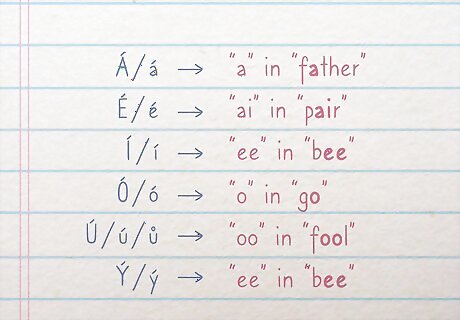
Practice long vowel sounds. Long vowels are marked in Czech by a short slanting line above the letter. The only exception is with the letter "u." A "ú" is only used if the letter is at the beginning of the word. If you see it anywhere else, an open dot over the letter is used instead ("ů"). However, the pronunciation remains the same. Each of the 6 vowels has a long version. "Á/á" makes an "ah" sound, similar to the "a" in the English word "father." "É/é" makes an "ai" sound, similar to the "ai" in the English word "pair." "Í/í" makes an "ee" sound, similar to the "ee" in the English word "bee." "Ó/ó" makes an "oh" sound, similar to the "o" in the English word "go." "Ú/ú/ů" makes an "oo" sound, similar to the "oo" in the English word "fool." "Ý/ý" makes an "ee" sound, similar to the "ee" in the English word "bee."
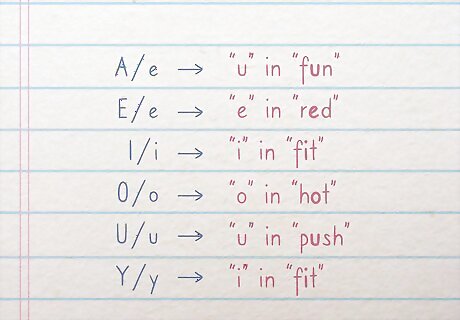
Add short vowel sounds. If a Czech vowel doesn't have a mark over it, you pronounce it with the short sound. As in English, each vowel has both a short and a long version, although the sounds of Czech short vowels can be different. "A/a" makes an "uh" sound, similar to the "u" in the English word "fun." "E/e" makes an "e" sound, similar to the "e" in the English word "red." "I/i" makes an "ih" sound, similar to the "i" in the English word "fit." "O/o" makes an "ah" sound, similar to the "o" in the English word "hot." "U/u" makes an "uh" sound, similar to the "u" in the English word "push." "Y/y" makes an "ih" sound, similar to the "i" in the English word fit.Tip: The vowels "i" and "y" make the same sounds, whether long or short. Generally, "y" or "ý" follows hard consonants, while "i" or "í" follows soft consonants.
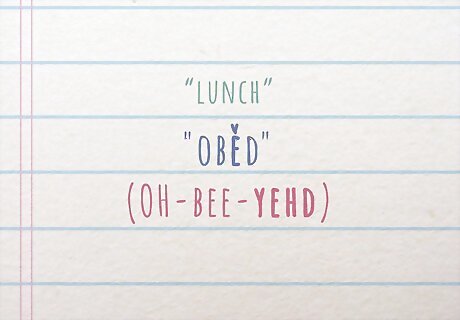
Understand how to use the softening vowel. The softening vowel, "ě," produces no sound on its own. It only appears after the consonants "b," "d," "m," "n," "p," "t," and "v." It softens either the consonant before it or the entire syllable where it appears. To pronounce the consonant or syllable, think in terms of pronouncing an "ee" sound followed by a "y" (a "j" in the Czech alphabet) after the initial consonant. For example, the Czech word "oběd" (which means "lunch") would be pronounced "OH-bee-yehd."
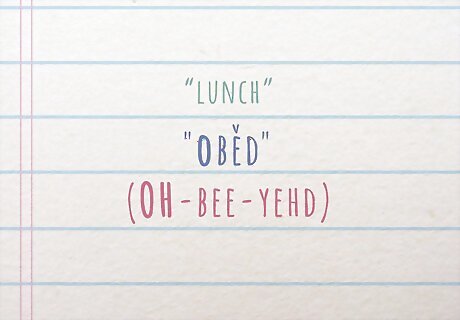
Stress the first syllable in Czech words. The stress in all Czech words is the same, which makes words relatively easy to pronounce. Once you know how to sound out the word, you don't have to worry about putting the emphasis on the wrong syllable. The first syllable always takes the primary stress. With longer words, you may have secondary stress. Only syllables with long vowels ever take secondary stress.
Starting Basic Conversations
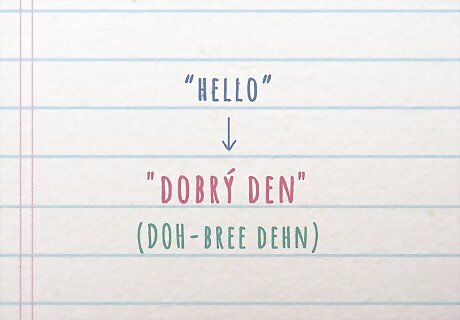
Say "hello" with "dobrý den" (DOH-bree dehn). This is the basic way to say "hello" in Czech, and is suitable in any situation and at any time of day. You can also switch it up with other greetings, depending on when you're greeting the person. In the morning, try "dobré ráno" for "good morning." In the afternoon, you could also say "dobré odpoledne" for "good afternoon." For an evening greeting, use "dobrý večer," which means "good evening."
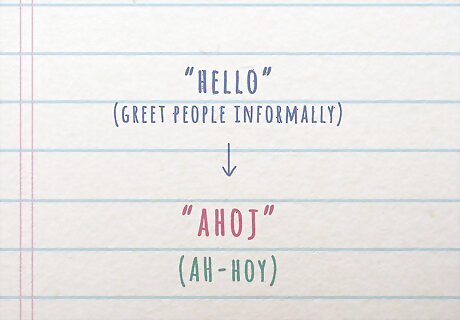
Try "ahoj" (AH-hoy) to greet people you know informally. This greeting is appropriate when you're greeting close friends or people you know who are around your age or younger. This isn't a greeting you would want to use with someone significantly older than you or who is in a position of authority, because it's considered to casual. Similar to the Hawaiian greeting "aloha," this word can be used to mean either "hello" or "goodbye." Another casual greeting that means both "hello" and "goodbye" is "čau," pronounced similarly to the Italian "ciao."
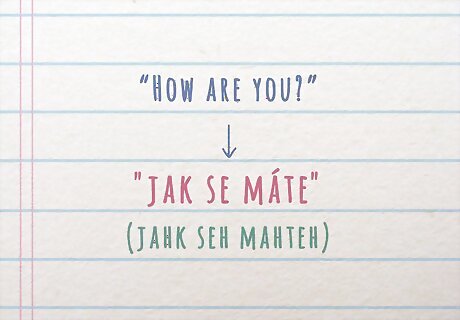
Follow up with "jak se máte" (jahk seh mahteh) to ask how someone's doing. Typically, after saying "hello," you might ask "How are you?" In Czech, you would ask "Jak se máte?" The common response is "Děkuji, dobře. A vy?" This means roughly "Fine thanks, and you?" If you're speaking informally to someone you know relatively well, you might also ask "Jak se máš?" The informal response would be "Mám se dobře, děkuji." You could also simply say "Dobré. A copak Ty?"
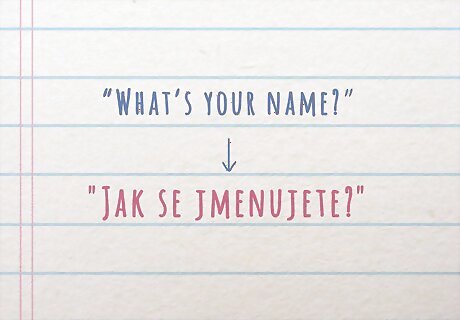
Ask someone their name by saying "Jak se jmenujete?" This is the relatively formal way to ask someone their name, so it's appropriate in most contexts, given that if you're asking someone their name you don't know them. You could also ask "Jaké je vaše jméno?" Both questions have essentially the same meaning. The response to the questions varies depending on which question you asked. If you asked "Jak se jemenujete?" the person would respond "jemenuju se" followed by their name. If you asked "Jaké je vaše jméno?", on the other hand, they would respond "moje jméno je," again, followed by their name.Tip: Once introductions have been made, you might say "Těší mě, že Vás poznávám," which means "pleased to meet you."
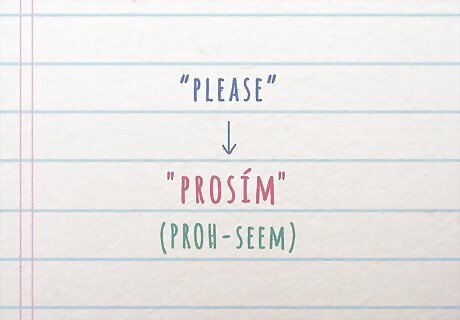
Use "prosím" (PROH-seem) to say "please." While the word "prosím" could be most literally translated into English as "please," in the Czech language it has many different uses and meanings. Czech-speakers use it not only after asking for something, but also when offering something, similar to how you would say "you're welcome" in English. It can also be used to mean "What did you say?" This makes it especially helpful if you are just starting to learn Czech and are chatting with a native speaker who's speaking a bit too fast. You could also say "prosím mluvte pomaleji" (please speak more slowly) or "prosím, zopakujte to ještě jednou" (please say that again).
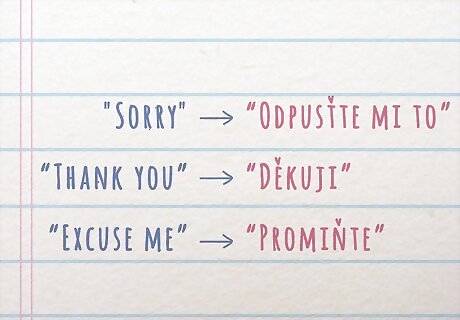
Add other polite words and phrases to show respect. When speaking to a native Czech speaker, a little politeness can go a long way — especially if you're just learning the language and find it hard to communicate. Some basic polite words and phrases you should know include: Odpusťte mi to: "Sorry." This is the formal version. Informally, you would say "promiň." Czech-speakers also say "pardon," pronounced in the French way (PAHR-dohn). Děkuji: "Thank you." To say "thanks" informally, simply shorten it to "dík" or "díky." "Prosím" is the common response to "thank you." In this context, it essentially means "don't mention it." Promiňte: "Excuse me." You can also use the various words and phrases for "sorry" in this context.
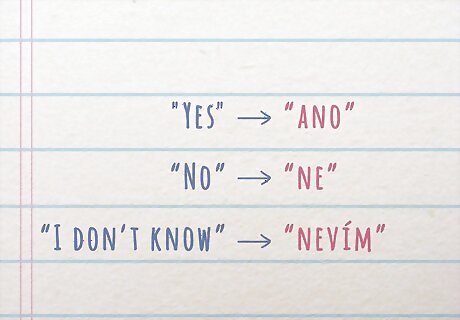
Distinguish between "yes" and "no" in Czech. Especially in a basic conversation, you'll likely be asking a lot of yes/no questions. Unfortunately, if you're a native English, Spanish, or French speaker, you may find yourself confusing a "yes" response for a "no" response. "Yes" in Czech is "ano" (AH-noh). However, it's frequently shortened simply to "no" in casual conversation. If you don't know this, it's easy to get confused. "No" in Czech is "ne" (NEH). If you think of this in comparison to "nay," which also means "no," this is fairly easy to remember. If you want to say "I don't know," say "nevím" or "já nevím."
Immersing Yourself in the Language
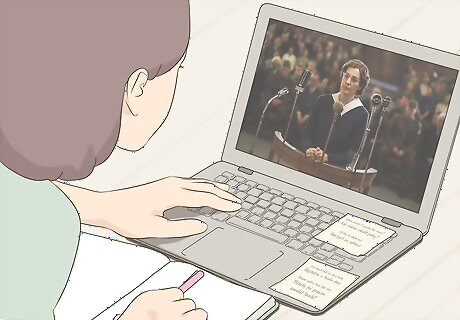
Watch videos and movies in Czech. Czech videos and movies are likely available on websites such as YouTube or on video-streaming services, such as Netflix or Hulu. Watch them with subtitles turned off to immerse yourself in the language. If you can find Czech reality shows online, these can be good examples of how Czech people normally speak. Scripted dialog is often too formal to sound natural in regular conversations. Turning on subtitles in Czech (rather than your native language) can help you associate the spoken words with their written form. However, keep in mind that subtitles aren't always exactly word for word.

Listen to music with Czech lyrics. Music tends to use relatively simple vocabulary, and the repetition can help you learn words and phrases more easily. The melody also helps the words stick in your memory. Sites like YouTube have music videos with Czech lyrics. You might also search for Czech music on your favorite music streaming service. Listen to Czech music during your commute to work or school or while you're doing chores. Over time, your brain will become more familiar with the sound of the Czech language, even if you don't necessarily understand all the words yet.Tip: When you first start, it may be tempting to find a translation of the lyrics in your native language. However, if you're learning by immersion, it's better to try to understand the lyrics as best you can from the context of the song rather than relying on a translation, which may not be exact.
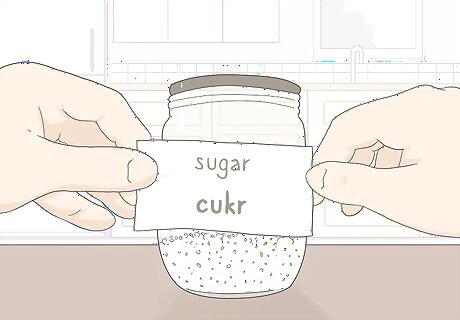
Label items around your home with the Czech word. Using labels can help you learn the spelling of Czech words as well as memorize the name for common objects you'll see around your home. Since these are likely objects you would mention in casual conversation, this can be an effective way to build your vocabulary relatively passively. Each time you walk by a labeled object, read the label and say the word out loud. Don't label too many objects at once. Aim for only one or two in a room. Once you've got those words down, you can label different objects.

Read simple children's books written in Czech. When you learned to read your native language, you started with children's books written in simple sentences with a limited vocabulary. Similar books written in Czech can help you understand the language better. Children's books are also often illustrated, so if you encounter a new word, you can figure it out from the context using the illustrations as a clue. Check out the Little Czech Primer at https://www.czechprimer.org/index.html for helpful vocabulary with pictures and stories. The site also includes links to other Czech language learning and reading resources. There are a number of coloring books, worksheets, and reading activities available for free at https://www.detskestranky.cz/. While these are designed for Czech children, they're also perfect for anyone learning the language to practice their skills. You could also check out Časopis AHOJ, an online magazine for people learning Czech. It uses simple phrases and basic vocabulary and is available for free at https://www.casopis-ahoj.cz/.

Talk to native speakers. If you're fortunate enough to live near a Czech community, you may have no problem finding native speakers to chat with. However, if there aren't any Czech people living near you, look for a chat partner online to practice Czech with. There are several websites that serve as a platform to connect language learners, including Conversation Exchange (https://www.conversationexchange.com/) and iTalki (https://www.italki.com/partners). HelloTalk (https://www.hellotalk.com/?lang=en) is a smartphone app available for both iPhones and Android devices that allows you to practice your writing with native speakers.
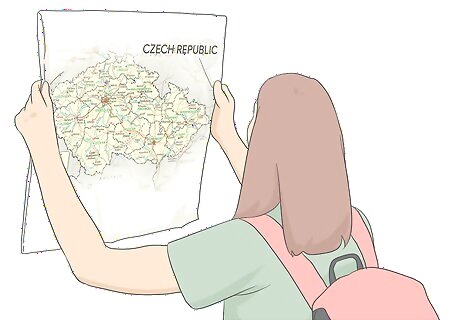
Visit the Czech Republic. Prague is a popular tourist destination. If you can take a trip to the area, you'll have the opportunity to see and hear Czech spoken around you constantly. Travel to the Czech Republic is truly the most immersive experience you can have with the Czech language. While you'll likely find plenty of people in Prague who can speak English, if you venture out into more rural areas, many of the people you meet will only speak the local language. This is a good opportunity to practice your speaking skills as well as your understanding of the spoken and written language.















Comments
0 comment